Europa Europa Blu-ray Movie
HomeEuropa Europa Blu-ray Movie 
Criterion | 1990 | 112 min | Not rated | Jul 09, 2019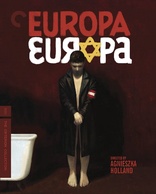
Movie rating
7.8 | / 10 |
Blu-ray rating
| Users | 0.0 | |
| Reviewer | 3.0 | |
| Overall | 3.0 |
Overview
Europa Europa (1990)
As World War II splits Europe, sixteen-year-old German Jew Salomon is separated from his family after fleeing with them to Poland, and finds himself reluctantly assuming various ideological identities in order to hide the deadly secret of his Jewishness. He is bounced from a Soviet orphanage, where he plays a dutiful Stalinist, to the Russian front, where he hides in plain sight as an interpreter for the German army, and back to his home country, where he takes on his most dangerous role: a member of the Hitler Youth.
Starring: Marco Hofschneider, Renť Hofschneider, Solomon Perel, Julie Delpy, Piotr KozlowskiDirector: Agnieszka Holland
| Foreign | 100% |
| War | 27% |
| History | 7% |
| Drama | Insignificant |
Specifications
Video
Video codec: MPEG-4 AVC
Video resolution: 1080p
Aspect ratio: 1.66:1
Original aspect ratio: 1.66:1
Audio
German: LPCM Mono (48kHz, 24-bit)
Subtitles
English
Discs
Blu-ray Disc
Single disc (1 BD)
Playback
Region A (locked)
Review
Rating summary
| Movie | 3.0 | |
| Video | 4.0 | |
| Audio | 5.0 | |
| Extras | 3.5 | |
| Overall | 3.0 |
Europa Europa Blu-ray Movie Review
Reviewed by Dr. Svet Atanasov August 11, 2019Agnieszka Holland's "Europa Europa" (1990) arrives on Blu-ray courtesy of Criterion. The supplemental features on the disc include exclusive new video interviews with the director of the film, actor Marco Hofschneider, Holocaust survivor Salomon Perel, and more. The release also arrives with an illustrated leaflet featuring an essay by critic Amy Taubin as well as technical credits. In German, with optional English subtitles for the main feature. Region-A "locked".
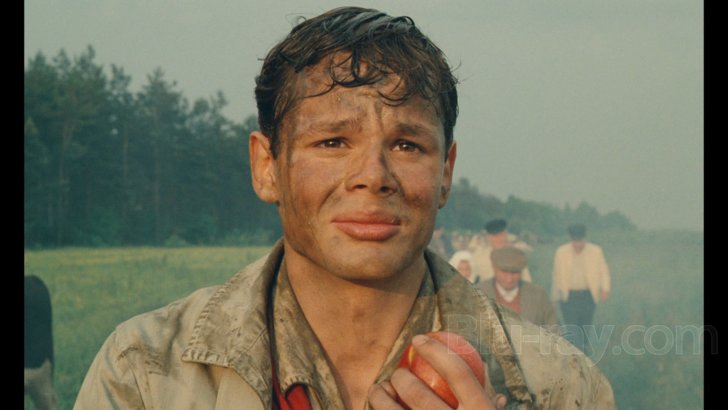
If you spend some time reading old reviews of Agnieszka Hollandís Europa Europa you will quickly realize that there are equally big groups of vocal supporters and critics of the film. I would like to offer my thoughts on why this obvious division exists.
The film is loosely based on the recollections of Salomon Perel, a Holocaust survivor who is still alive. He was born in 1925 in Peine, Germany, where as a boy he helped his family run a small shoe store. When Hitlerís goons started targeting the cityís Jewish population, Salomon (identified in the film first as Sally and then Josef) ran away and ended up in a Soviet orphanage, where for a while he was taught how to properly praise Stalin and his henchmen. When the Nazis eventually raided the place and captured him, he managed to stay alive by making them believe that he was one of them. A fatherless captain then decided to adopt him and used his connections to get him in an elite school where Hitlerís brainwashers were preparing the next generation of Nazi leaders. At that time Salomon had no idea what had happened to his real family and where to look for them, or if they were actually still alive. When Hitlerís armies vanished in the frozen fields of Stalingrad and the Soviets entered Germany, Salomon was again captured. He tried telling the Soviets his story, but what was coming out of his mouth was so unbelievable that they did not even want to consider the possibility that he was telling the truth. A small miracle then saved him from being executed together with many of his former Nazi Ďfriendsí from the elite school.
It is understandable why the supporters of the film focus on Salomonís struggle to stay alive while surrounded by people who would have skinned him alive if they knew that he was a chameleon. The real experience must have been an utterly maddening nightmare, and the fact that Salomon was able to act his part so well and for so long to convince everyone that he was right where he belongs is simply astonishing. (Of course, if everything occurred exactly as it is shown in the film, and there isnít a shortage of material that at the very least looks more than a bit suspicious).
The critics of the film focus on something else, which is the overdramatization of different parts of Salomonís story and the fact that there is a prominent Hollywood-esque flavor that is infused with it. It hurts the film in a couple of different ways. For example, the camera routinely follows Marco Hofschneider, the young actor that plays Salomon, with the odd intent of making him look attractive in situations whose already shaky credibility suffers even more because of it. (For reference, the hectic movement of the camera in Jan Nemecís Diamonds of the Night accomplishes exactly the opposite). Then there is Hollandís puzzling desire to emphasize flat-out grotesque material -- such as the dance in the orphanage where Hitler and Stalin are seen next to each other -- which creates the impression that it was actually meant for a different type of film, like a parody that a master such as Emir Kusturica would envision to scold the ridiculous nature of life and politics on the Balkans. And, of course, there is the completely random decision to embellish Salomonís ordeal even more by bringing in Stalinís son, placing him next to him, and then inventing his Ďaccidentalí discovery and detention by the Nazis. Simply put, there is too much rampant reimagining of events and situations with too much thick Hollywood-esque flavor on top of it not to ponder what could have been if authenticity was the filmís top priority.
A lot of the editing choices are problematic as well. In fact, the key reason why so many crucial events throughout the film often look completely random and unbelievable is the manner in which contrasting material is essentially mismanaged.
The highlight of the film is a predictably brilliant soundtrack from Zbigniew Preisner, who also scored Krzysztof Kieslowskiís acclaimed Three Colors Trilogy.
*Two lesser-known but much better films about survival during the Holocaust are Lajos Koltaiís Fateless and Radu Mihaileanuís Train of Life. In the former, a fourteen-year-old Hungarian boy is sent to a concentration camp where he fights for his life and in the process becomes a man. In the latter, the residents of a Jewish village somewhere in Central Europe built a fake deportation train to get them to Palestine. This film offers a great example of how to effectively mix humor and drama while recreating the maddening reality of the Holocaust.
Europa Europa Blu-ray Movie, Video Quality 
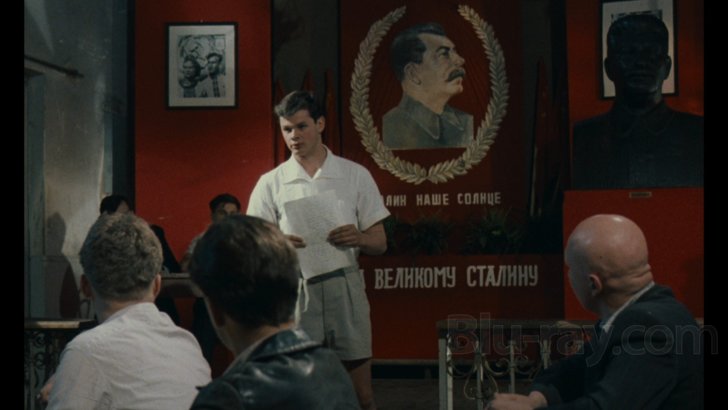
Presented in its original aspect ratio of 1.66:1, encoded with MPEG-4 AVC and granted a 1080p transfer, Agnieszka Holland's Europa Europa arrives on Blu-ray courtesy of Criterion.
The following text appears inside the leaflet that is provided with this Blu-ray release:
"This new digital restoration, made with the support of Centre national du cinťma et de l'image animťe, was created in 2K resolution from 35mm original camera negative. The monaural soundtrack was remastered from the original Sony DASH 3324 digital tapes at Eclair in Vanves, France. Additional restoration was performed by the Criterion Collection.
Transfer supervisor: Agnieszka Holland.
Colorist: Raymond Terrentin/Eclair, Vanves, France."
The film does have a unique stylistic appearance and the new remaster replicates it quite well. The warm yellowish font that you see isn't the end product of a recoloring job. However, I also think that there is range of blues and to a lesser extent red that are suppressed, which is why in certain areas the overall balance isn't too convincing. Delineation and especially density are superb. Predictably, even on a very large screen the visuals often look striking. This being said, in some darker areas the dynamic range could have been better if the grading job was more careful (screencaptures #7 and 19 illustrate the issue very well). Image stability is excellent. There are no debris, cuts, damage marks, or other conventional age-related imperfections to report.
Europa Europa Blu-ray Movie, Audio Quality 
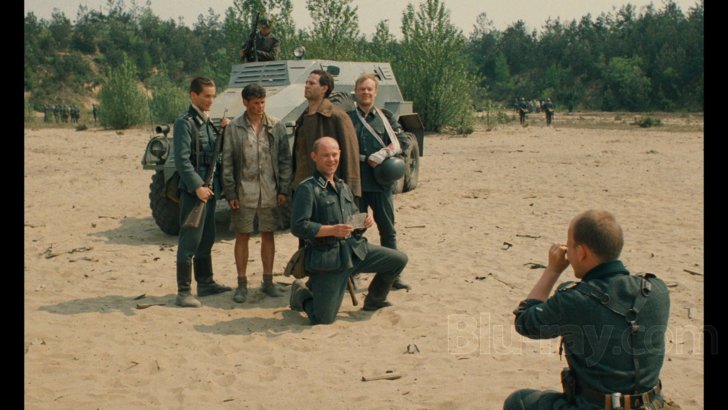
There is only one standard audio track on this Blu-ray release: German LPCM 1.0 (with portions of Russian, Polish, and Hebrew). Optional English subtitles are provided for the main feature.
There are no technical or encoding anomalies to report in our review. The audio is very clear, nicely balanced, and stable. The music of Zbigniew Preisner also easily floods the film with atmosphere. The shootouts and mass fighting have good intensity as well.
Europa Europa Blu-ray Movie, Special Features and Extras 
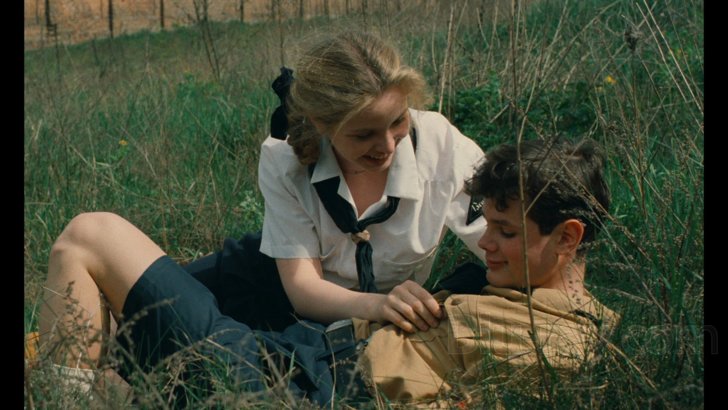
- Agnieszka Holland - in this new video interview, director Agnieszka Holland explains what inspired her to do Europa Europa and discusses the unique experience of its main protagonist and the type of stylistic identity she wanted her film to have. The interview was conducted exclusively for Criterion in Warsaw in 2019. In English, not subtitled. (16 min, 1080p).
- Marco Hofschneider - in this new video interview, actor Marco Hofschneider recalls how he was cast to play the character of Sally and then explains what it was like to work with Agnieszka Holland during the shooting of Europa Europa. The interview was conducted exclusively for Criterion in Berlin in 2019. In English, not subtitled. (21 min, 1080p).
- On Europa Europa - presented here is a new video essay by film scholar Annette Insdorf, which was created exclusively for Criterion in 2019. In English, not subtitled. (14 min, 1080p).
- Salomon Perel - in this new video interview, Salomon Perel, whose book inspired Agnieszka Holland to shoot Europa Europa, recalls his initial encounter with the director and discusses some of his experiences during and after WW2. The interview was conducted exclusively for Criterion in Tel Aviv in 2019. In German, with optional English subtitles. (21 min, 1080p).
- Audio Commentary - this archival commentary with director Agnieszka Holland was recorded in 2008.
- Leaflet - an illustrated leaflet featuring critic Amy Taubin's essay "Border States" as well as technical credits.
Europa Europa Blu-ray Movie, Overall Score and Recommendation 

Agnieszka Holland's Europa Europa goes down the same path that many of Emir Kusturica's films choose -- it blends humor and drama while it frequently evolves into something of a grotesque dream to make it easier for its audience to grasp the nature of a maddening reality. Unfortunately, Holland is unable to manage the overlapping of the contrasting material as well as Kusturica does, and on top of this her film finds plenty of room for overused Hollywood tricks and cliches that do some serious damage to the fascinating story it tells. Criterion's new release of Europa Europa is sourced from a recent 2K restoration of the film that was supervised by Holland. RENT IT.
Similar titles
Similar titles you might also like

My Way
마이웨이 / Mai Wei
2011

Generation War
Unsere MŁtter, unsere Všter
2013

In the Fog
V tumane
2012

Germany Year Zero
Germania anno zero
1948

The Captain
Der Hauptmann
2017

Lore
2012

Army of Shadows
L'armťe des ombres
1969

Phoenix
2014

The Marriage of Maria Braun
Die Ehe der Maria Braun
1978

Come and See
Иди и смотри / Idi i smotri
1985

The 12th Man
Den 12. mann
2017

Fires on the Plain
野火 / Nobi
1959

Ashes and Diamonds
Popiůl i diament
1958

The Ascent
Восхождение / Voskhozhdenie
1977

In Darkness
2011

Sophie Scholl: The Final Days
Sophie Scholl: Die letzten Tage | 4K Restoration
2005

Transit
2018

Alexander Nevsky
Александр Невский / Aleksandr Nevskiy
1938

War of the Arrows
Choi-jong-byeong-gi Hwal
2011

A Hidden Life
2019